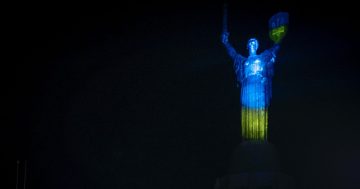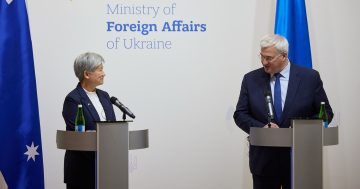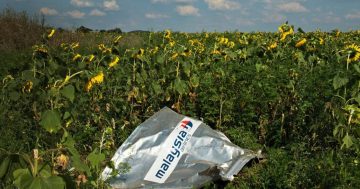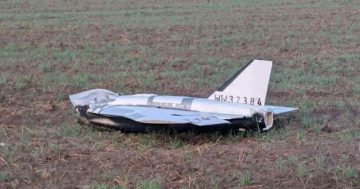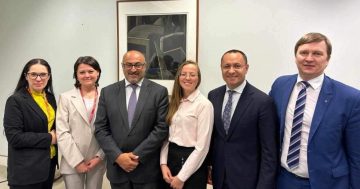Rayhan Demytrie* says Ukraine, Moldova and Georgia are all seeking a path into the European Union. However, Georgia’s democratic credentials have been questioned by the European Parliament.
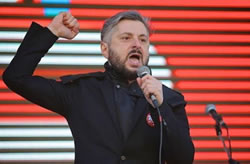 European Union leaders are to decide later this month whether to welcome Ukraine, Moldova and Georgia as candidate States for membership of the European Union.
European Union leaders are to decide later this month whether to welcome Ukraine, Moldova and Georgia as candidate States for membership of the European Union.
Russia’s invasion of Ukraine has prompted the three former Soviet Republics to submit emergency applications in the first weeks of the war.
Ukraine’s prospects look promising, and so do Moldova’s, but Georgia has been slapped with a scathing European Parliament resolution, described by one MEP as the last “wake-up call” to the Government in Tbilisi.
Ukraine has led the way in arguing that joining the EU has become a geopolitical necessity, although the three States are known as the Association Trio for their co-operation with the EU on everything from political reforms to free trade.
Addressing MEPs in Strasbourg earlier this month, Ukraine’s Parliamentary Speaker, Ruslan Stefanchyk said granting candidate status would empower the Ukrainian people, while “any other signal would only benefit Russian President, Vladimir Putin and his regime”.
Moldova’s pro-EU President, Maia Sandu, told the European Parliament last month that her country still had a long way to go.
However, she reminded them that many Moldovans could hear the bombs falling on the Ukrainian city of Odesa from their homes.
In the run-up to the EU’s decision, Brussels think-tank, the Centre for European Studies published reports on Ukraine and Moldova’s applications.
It said Ukraine faced an existential crisis, while Moldova was “next at risk” from Russian aggression.
It recommended that the EU should extend candidate status to both countries — that status far from guarantees entry to the EU, but does represent a significant step on the path.
On Georgia, the report said the formal access process would be premature.
Its economic reforms had surpassed both Ukraine and Moldova and other EU candidate states, it said, but on democracy, the Government had contradicted “the EU’s fundamental values”.
The European Parliament backed a strongly-worded resolution calling on Georgia to uphold the highest standards of democracy and rule of law.
It said press freedom had been declining dramatically and condemned the intimidation and persecution of journalists.
Last year more than 50 media workers were hurt in far-right violence, but the Government failed to prosecute any of the organisers.
Instead it has launched criminal investigations into owners of independent media channels critical of the Government.
The head of Georgia’s leading opposition Mtavari TV channel, Nika Gvaramia, has been jailed for three-and-a-half years, in what Amnesty International described as a “blatant act of politically-motivated prosecution”.
“I am a political prisoner and the timing of my imprisonment is deliberate,” Mr Gvaramia (pictured) wrote in a letter to the BBC delivered by his lawyers.
Mr Gvaramia, who was found guilty of misusing company funds, said his imprisonment was a message from the Georgian Government “aimed at the open and aggressive sabotage of Georgia’s European future”.
Georgia’s Government has rejected the criticism, describing Mr Gvaramia as an opposition leader hiding behind journalism.
The head of the ruling party added that the resolution from Brussels had nothing to do with European values.
Prime Minister, Irakli Gharibashvili said earlier this month he expected a “wise decision from the European Union”.
“Let’s be open and frank here. When Russia invaded Georgia in 2008 no-one in this world imposed sanctions,” Mr Gharibashvili said.
“That led to a sense of impunity in Moscow, prompting Russia’s invasion of Crimea in 2014 and the launch of full-scale war against Ukraine in February.”
The Prime Minister said Georgia deserved as much recognition from the EU as Moldova and Ukraine.
“The answer from the West must be adequate, relevant: it must be proportional,” he said.
However, the treatment of ex-President Mikheil Saakashvili and other opposition figures has raised alarm.
Mr Saakashvili, who was in power at the time of the Russian invasion of Georgia, was detained when he returned last year to back the opposition in elections.
Both he and Mr Gvaramia say they are victims of a political vendetta by the country’s sole oligarch, Bidzina Ivanishvili.
Mr Ivanishvili, who made his fortune in Russia, founded the governing Georgian Dream Party in 2011. While he is no longer its Chair, his influence in politics remains a matter of concern for Brussels.
A recent investigation by anti-corruption watchdog, Transparency International Georgia alleged that Mr Ivanishvili may still have business interests in Russia.
The European Parliament’s resolution calls for the businessman to face EU sanctions, highlighting his personal and business links to the Kremlin. He denies being close to the Russian leadership.
Like Ukrainians and Moldovans, Georgians are overwhelmingly in favour of EU membership according to opinion polls.
The question is whether the EU would want to risk disappointing the majority of Georgians.
*Rayhan Demytrie is a journalist with the British Broadcasting Corporation, based in Tbilisi, Georgia and covering the South Caucasus and Central Asia.
This article first appeared on the BBC website.


